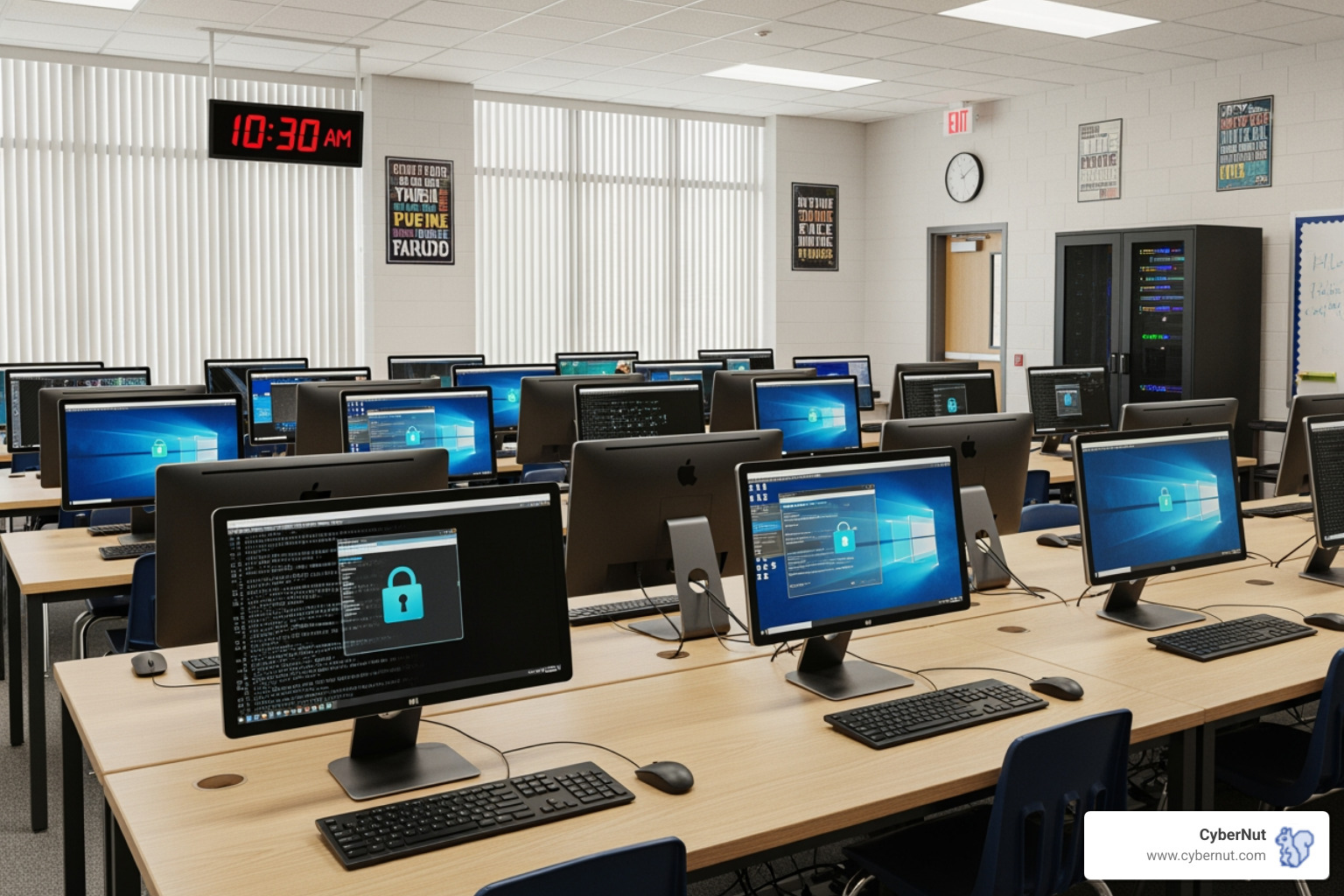Why South Carolina Schools Must Prioritize Data Breach Preparedness
What to Know About SC's Data Breach Notification Rules for Schools is essential for every K-12 administrator, IT director, and school board member in the state. With ransomware attacks on the rise—29 confirmed attacks on U.S. educational institutions in 2025 alone—understanding your legal obligations is critical.
Quick Answer: South Carolina's Key Data Breach Notification Requirements for Schools
- Legal Foundation: Schools must comply with S.C. Code § 39-1-90 when personal information is compromised.
- What Triggers Notification: Unauthorized access to unencrypted data containing names plus SSNs, driver's licenses, or financial account information.
- Timeline: Notify affected individuals "in the most expedient time possible and without unreasonable delay."
- Who to Notify: Affected residents, SC Department of Consumer Affairs (if >1,000 people), and consumer reporting agencies.
- Penalties: Up to $1,000 per affected resident for knowing and willful violations, plus potential civil lawsuits.
The threat is real. School District Five of Lexington & Richland Counties recently suffered a breach affecting over 31,000 people, exposing names, Social Security numbers, and financial data. The attack forced the district to offer credit monitoring and identity theft insurance to victims.
Educational institutions are prime targets because they store vast amounts of sensitive data, often with limited cybersecurity budgets. As the SC State Superintendent of Education emphasized, "The recent cybersecurity breach affecting one of our school districts underscores the growing cybersecurity threats facing our schools and the critical need for proactive measures to safeguard our systems and sensitive data."
This guide breaks down what South Carolina law requires, how to respond, and how to prevent breaches before they happen.

What to Know About SC's Data Breach Notification Rules for Schools

Understanding South Carolina's data breach notification rules is the foundation of responsible data stewardship. The requirements are outlined in South Carolina's data breach notification statute, specifically S.C. Code § 39-1-90. This law applies to all schools and is overseen by the South Carolina Department of Consumer Affairs. The bottom line is that when sensitive data is compromised, you have a legal duty to notify affected individuals to protect them from potential identity theft and fraud.
What Triggers a Notification? Defining a 'Security Breach'
A reportable breach involves the unauthorized access and acquisition of computerized data. This applies only when the data was not rendered unusable or unreadable through encryption or similar measures. The access must compromise the data's security, confidentiality, or integrity, creating a material risk of harm or making illegal use of the data reasonably likely. A good-faith acquisition by an employee for legitimate school purposes, without misuse, is generally not considered a breach. The key question is: "Could this incident realistically lead to identity theft or other harm?" If yes, it's likely a reportable breach.
Under SC law, "personally identifiable information" (PII) is an individual's first name (or initial) and last name combined with any of these unencrypted or unredacted data elements:
- Social Security number
- Driver's license number or state identification card number
- Financial account, credit card, or debit card number, especially with security codes or passwords
- Other unique government-issued identification numbers
The phrase "unencrypted or unredacted" is critical. Properly encrypted data may not trigger notification requirements if the encryption key remains secure. This makes encryption a powerful legal shield, not just an IT best practice.
The Notification Process: Who, When, and How to Notify
Once a breach of PII is confirmed, the notification process begins.
Who to Notify:
- Affected individuals (students, staff, parents).
- The Consumer Protection Division of the South Carolina Department of Consumer Affairs if the breach affects over 1,000 SC residents.
- All nationwide consumer reporting agencies (e.g., Equifax, Experian) if notifying more than 1,000 people.
When to Notify:
- The law requires disclosure "in the most expedient time possible and without unreasonable delay." You are allowed reasonable time to determine the breach's scope, restore system integrity, and cooperate with law enforcement if an investigation is underway.
How to Notify:
- Written notice (mail), electronic notice (if it's the primary communication method), or telephonic notice are acceptable.
- Substitute notice (website posting, media notification) is allowed if direct notification costs exceed $250,000, affects over 500,000 people, or you lack contact information.
Consequences of Non-Compliance with SC's Data Breach Notification Rules for Schools
Ignoring these rules carries significant penalties.
- Administrative fines: Knowing and willful violations can lead to fines of up to $1,000 per affected resident.
- Private right of action: Affected residents can sue the district for damages. Willful violations can lead to broader damages and recovery of attorney's fees.
- Reputational damage: The loss of trust with parents and the community can be the most lasting consequence, impacting enrollment and relationships for years.
Compliance protects your budget, legal standing, and the core relationships of your educational mission. For related information, see our article on All About South Carolina's Student Identity Fraud Act. To identify vulnerabilities, consider a free phishing audit.

Finding a data breach is stressful, but a clear, practiced incident response plan transforms panic into purposeful action. Following a proven playbook helps you meet What to Know About SC's Data Breach Notification Rules for Schools and demonstrates responsible leadership. For help building your plan, see our guide on Incident Response Planning in K12.
Step 1: Containment and Assessment
Your first priority is to stop the attack.
- Isolate affected systems: Immediately disconnect compromised servers or network segments. This disruption is necessary to prevent further data theft or damage.
- Preserve evidence: Do not delete logs or wipe systems. These digital footprints are critical for forensic investigation and potential legal proceedings. Document all actions taken.
- Engage experts: Unless you have in-house forensic specialists, hire independent cybersecurity professionals to analyze the breach, identify entry points, and help secure your systems.
- Determine scope: Work with your team to understand which systems and what data were accessed or stolen. This assessment determines your legal notification obligations.
- Implement immediate security measures: Change passwords, apply patches, and close identified vulnerabilities to prevent further damage.
Step 2: Investigation and Legal Obligations
With the immediate threat contained, shift to a detailed investigation.
- Conduct forensic analysis: Have your cybersecurity experts reconstruct the attack timeline and definitively identify what data was compromised. This is essential for determining if PII was exposed.
- Consult legal counsel: Immediately engage attorneys specializing in data privacy. They will interpret whether the breach meets South Carolina's legal threshold for notification and guide you through the regulatory landscape.
- Determine notification duties: Based on forensic and legal advice, map out who you must notify (individuals, state agencies) and on what timeline.
- Document everything: Keep detailed records of the entire process, from findy to remediation. This documentation demonstrates good-faith compliance efforts. The SC Department of Education's Information Security Division can also be a resource.
Step 3: Communication and Support
How you communicate with your community is critical for rebuilding trust.
- Draft clear notification letters: Be transparent about the incident, specify the types of information involved, and outline the steps you've taken to resolve the issue. Provide clear contact information for questions.
- Offer support services: Following the example of other districts, offer free credit monitoring and identity theft insurance to affected individuals. This provides tangible protection and shows your commitment to making things right.
- Establish dedicated communication channels: Set up a hotline, dedicated email, or a website FAQ to manage inquiries efficiently and provide consistent answers.
Many breaches begin with phishing. While dealing with a crisis, consider how to prevent the next one with a free phishing audit.
Proactive Defense: Preventing Breaches in Your District

While a response plan is crucial, prevention should be every district's top priority. Smart, consistent security practices and training can dramatically reduce your risk. For a comprehensive overview, explore our guide on Cybersecurity for Educational Institutions.
Cybersecurity Best Practices for SC Schools
The SC State Superintendent of Education recommends several key strategies to stop attacks before they start.
- Staff and Student Training: Ongoing training is your first line of defense. Regular phishing simulations and cybersecurity awareness training help everyone recognize and report threats, turning your staff into a human firewall.
- Endpoint Protection: Use Endpoint Detection and Response (EDR/XDR) tools on all devices and actively manage them to investigate alerts promptly.
- Network Segmentation: Use VLANs to create secure zones within your network, limiting access to sensitive systems based on role. This contains damage if one area is compromised. Keep firewalls patched and properly configured.
- Multi-Factor Authentication (MFA): MFA is a non-negotiable layer of security. It prevents unauthorized access even if a password is stolen, and it is critical for all remote connections.
- Secure Backups: Maintain secure, isolated backups that are physically or logically separated from your main network to protect them from ransomware. Regularly test your backups to ensure they can be restored.
- Updated Incident Response Plan (IRP): Regularly review and update your IRP with current contact information and procedures. Practice the plan with tabletop exercises so everyone knows their role in an emergency.
Leveraging State and Federal Resources
South Carolina schools have access to excellent, often underused, resources.
- The SC Critical Infrastructure Cybersecurity (SC CIC) Program offers free intelligence, assessments, training, and incident response support for schools.
- The SC Department of Education Information Security Division can help districts evaluate their cybersecurity framework.
- Federal agencies like the Cybersecurity and Infrastructure Security Agency (CISA) provide free tools and guidance for the education sector.
- Family Educational Rights and Privacy Act (FERPA) compliance also requires implementing strong security practices to protect student records.
Since phishing is the top threat vector for schools, understanding your vulnerability is key. A free phishing audit can reveal where your training gaps exist.
Frequently Asked Questions about SC School Data Breach Rules
Here are answers to common questions about What to Know About SC's Data Breach Notification Rules for Schools:
Do these rules apply if the breached data was encrypted?
Generally, no. S.C. Code § 39-1-90 includes a "safe harbor" for data that is encrypted, redacted, or otherwise rendered unusable, unreadable, or indecipherable. If the encryption key was not also compromised, notification may not be required because the data is unusable to the unauthorized party, significantly reducing the risk of harm. This highlights why robust encryption for sensitive data is one of the most effective preventative measures.
What if a third-party vendor gets breached?
Schools rely on many third-party vendors that handle sensitive data. If one of them is breached, the law is clear.
- Vendor's Duty: The vendor has a legal obligation to notify your school district immediately upon finding a breach affecting your data.
- District's Responsibility: The school district, as the data owner, typically retains the ultimate responsibility for notifying affected individuals (students, parents, and staff).
This is why strong vendor contracts that explicitly outline security and notification duties are crucial. Always verify your vendors' security protocols.
How do SC's rules compare to other states?
All 50 states have data breach laws, but the specifics vary. While South Carolina is part of a nationwide standard, there are key differences compared to other states:
- Timelines: SC uses a flexible "most expedient time possible" standard. Other states mandate fixed timelines, such as 30, 45, or 60 days.
- PII Definitions: Definitions of Personally Identifiable Information are generally similar, but some states include additional categories like medical or biometric data.
- Notification Thresholds: The requirement to notify state agencies at a certain number of affected residents (1,000 in SC) varies by state.
- Penalties: Fines and the right for individuals to sue differ significantly across states.
While many principles are consistent, districts must focus on the specific nuances of South Carolina's regulations to ensure compliance.
Conclusion: Building a Cyber-Resilient School District
The digital age offers immense benefits to education but also brings significant cyber threats. Understanding What to Know About SC's Data Breach Notification Rules for Schools is about more than compliance—it's about safeguarding the trust communities place in our schools.
We've covered the legal framework of S.C. Code § 39-1-90, the steps for an immediate response, and the importance of communication. However, prevention is the best strategy. Implementing strong cybersecurity best practices—like comprehensive training, MFA, and secure backups—protects your data, reputation, and ability to focus on educating students.
Fortunately, you are not alone. Resources like the SC Critical Infrastructure Cybersecurity (SC CIC) Program and the SC Department of Education Information Security Division are available to help districts strengthen their defenses.
Creating a cyber-resilient district requires a culture of security awareness where everyone understands their role. At CyberNut, we specialize in building that culture in K-12 schools. Our automated, gamified micro-trainings make cybersecurity engaging for students and staff, ensuring the lessons stick.
Since phishing is the number one way attackers breach schools, understanding your specific risk is the first step. We encourage every South Carolina district to schedule a free phishing audit to get actionable insights on your vulnerability.
For more tools to build a strong cybersecurity culture, visit our resources page. Together, we can build schools where technology improves learning without exposing our communities to unnecessary risk.









